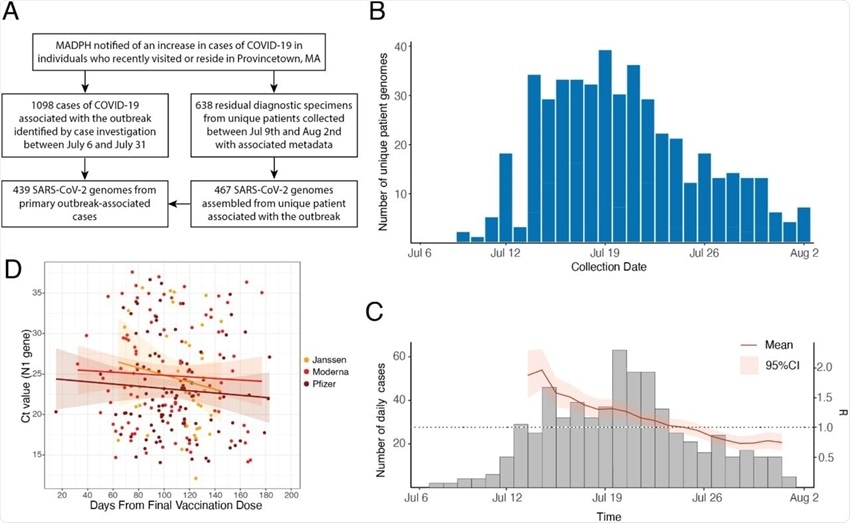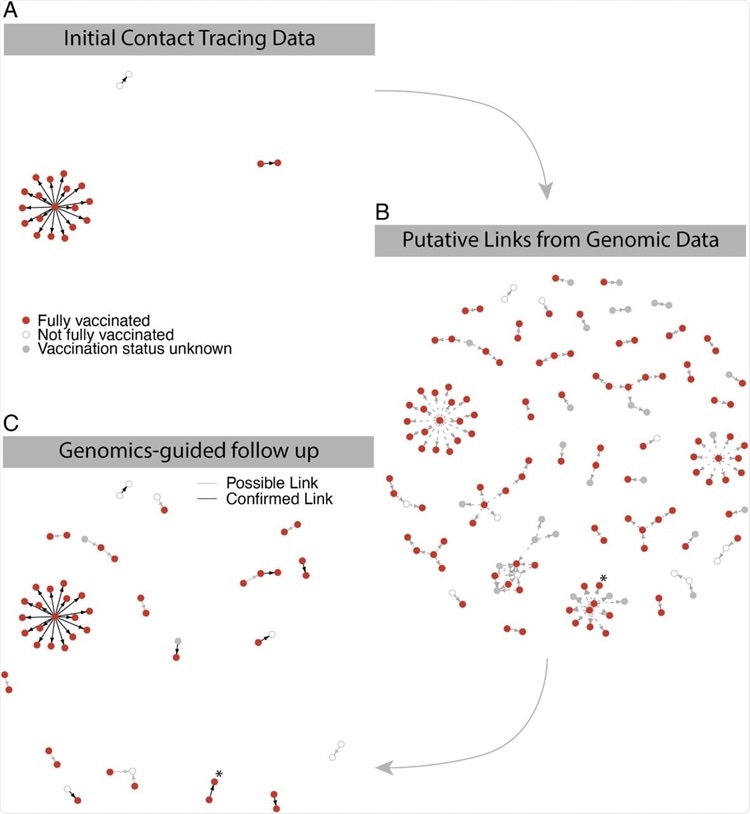Harvard And MADPH Study Shows That Delta Sub-Variant AY.25 Is Transmitted By Fully Vaccinated Individuals And Causes Breakthrough Infections!
Source: Delta-sub-variants Oct 26, 2021 3 years, 6 months, 21 hours, 17 minutes ago
A new study lead by the Broad Institute of Harvard and MIT, Cambridge-USA and the MADPH (Massachusetts Department of Public Health) has confirmed that fully vaccinated individuals are responsible for transmitting and spreading the new Delta sub-variants including the the AY.25 sub-variant which has been responsible for a surge in Massachusetts.
.jpg)
Multiple summer events, including large indoor gatherings, in Provincetown, Massachusetts (MA), in July 2021 contributed to an outbreak of over one thousand COVID-19 cases among residents and visitors. Most cases were fully vaccinated, many of whom were also symptomatic, prompting a comprehensive public health response, motivating changes to national masking recommendations, and raising questions about infection and transmission among vaccinated individuals.
In order to characterize the outbreak and the viral population underlying it, the study team combined genomic and epidemiological data from 467 individuals, including 40% of known outbreak-associated cases.
The Delta variant accounted for 99% of sequenced outbreak-associated cases. Phylogenetic analysis suggests over 40 sources of Delta in the dataset, with one sub-variant AY.25 responsible for a single cluster containing 83% of outbreak-associated genomes. This cluster was likely not the result of extensive spread at a single site, but rather transmission from a common source across multiple settings over a short time. Genomic and epidemiological data combined provide strong support for 25 transmission events from, including many between, fully vaccinated individuals; genomic data alone provides evidence for an additional 64. Together, genomic epidemiology provides a high-resolution picture of the Provincetown outbreak, revealing multiple cases of transmission of Delta from fully vaccinated individuals.
The study findings were published on a preprint server and are currently being peer reviewed.
https://www.medrxiv.org/content/10.1101/2021.10.20.21265137v1
The MADPH or Massachusetts Department of Public Health on the 10th of July 2021, received reports of a surge in COVID-19 cases among residents of Provincetown, MA, or people who had recently visited the town.
The tourist town: Provincetown is on Cape Cod that attracted thousands of visitors. Many domestic visitors reported attending multiple large public and indoor gatherings. The visits started with the 4th of July weekend and continued through the following week.
It was reported that subsequently, severe acute respiratory syndrome coronavirus 2 (SARS-CoV-2) infections in the area rose rapidly.
According to health officials, as of the 1st of July, the vaccination rate in Barnstable County (where Provincetown is located) was 68%. 74% of the total number of reported cases were fully vaccinated individuals, and 79% were symptomatic. This outbreak episode was the first large one in a highly vaccinated population in the US. This led to a thorough investigation, including SARS-CoV-2 genome sequencing.
The study findings describe the genomic epidemiology of this outbreak. It provides a deeper understanding of viral transmission from and between fully vaccinated individuals.
Patient samples were collected between July 9th and August 2nd, and, SARS-CoV-2 genomes were sequenced. Scientists produced high-quality SARS-CoV-2 genomes from 467 unique individuals,
including 439 samples that were associated with the outbreak. 80% of the samples sequenced came from males, the median age was 43, and 84% came from vaccinated individuals.
The study findings showed that the SARS-CoV-2 Delta variant drove the Provincetown outbreak with 99% of the samples sequenced as Delta. 84% were from the lineage AY.25, which is rarely observed outside North America but quite common in the USA.
 Epidemiology of the Provincetown outbreak and dataset overview. A. Flow diagram describing the main events of the Provincetown outbreak and relevant sample sets presented here. B. SARS-CoV-2 genomes by collection date. Where multiple samples were collected from the same patient, the earliest collection date is used. C. Distribution of all cases in Barnstable county over the time period of the study and estimate of Rt over the course of the outbreak. D. Ct values of the N1 gene for the 313 individuals known to be fully vaccinated by one of Janssen, Moderna, or Pfizer; includes linear regression with 95% confidence interval.
The study team analyzed diagnostic Ct values, which are an approximation of the viral load. The viral loads were similar between vaccinated and unvaccinated individuals and between symptomatic and asymptomatic individuals.
Epidemiology of the Provincetown outbreak and dataset overview. A. Flow diagram describing the main events of the Provincetown outbreak and relevant sample sets presented here. B. SARS-CoV-2 genomes by collection date. Where multiple samples were collected from the same patient, the earliest collection date is used. C. Distribution of all cases in Barnstable county over the time period of the study and estimate of Rt over the course of the outbreak. D. Ct values of the N1 gene for the 313 individuals known to be fully vaccinated by one of Janssen, Moderna, or Pfizer; includes linear regression with 95% confidence interval.
The study team analyzed diagnostic Ct values, which are an approximation of the viral load. The viral loads were similar between vaccinated and unvaccinated individuals and between symptomatic and asymptomatic individuals.
However, there were fewer asymptomatic cases because testing was focused on symptomatic cases. The Delta genomes in this dataset did not have novel variants of the spike protein, nor did they have a higher frequency of amino acid changes.
It was found that the average time since completion of the vaccination course was 111 days.
The
Delta-sub-variants study team observed that the viral loads decreased slightly as more time passed post-vaccination. However, this declining trend was not statistically significant in this dataset. Further, albeit insignificantly, the viral load decreased marginally with increasing age in vaccinated individuals. In the study cohort, on average, unvaccinated individuals were younger than vaccinated individuals.
The study team inferred that the Delta variant was introduced into the population from many sources based on a phylogenetic tree analysis. The earliest reported genomes within the cluster were from other states. This led researchers to believe that this lineage emerged outside MA and was introduced into the state just prior to amplification by the outbreak.
 Identification of putative transmission events from vaccinated individuals. A. High-confidence transmission links from contact tracing investigation. B. Predicted transmission links based on genomic sequence, intrahost variants, and symptom onset date. C. Genomics-predicted transmission links corroborated by further epidemiological follow-up. Putative contacts are grouped into possible links (grey lines) and known links (black lines) to denote plausible vs. confirmed contacts between transmission pairs. A confirmed transmission pair that is part of a larger cluster of putative links, described in the text, is marked with an asterisk.
Identification of putative transmission events from vaccinated individuals. A. High-confidence transmission links from contact tracing investigation. B. Predicted transmission links based on genomic sequence, intrahost variants, and symptom onset date. C. Genomics-predicted transmission links corroborated by further epidemiological follow-up. Putative contacts are grouped into possible links (grey lines) and known links (black lines) to denote plausible vs. confirmed contacts between transmission pairs. A confirmed transmission pair that is part of a larger cluster of putative links, described in the text, is marked with an asterisk.
The study team also observed a pattern, which indicated rapid spread from a single individual and-a signature of superspreading. However, public health investigation did not find any evidence of a single site shared among many cases. The specific transmission pattern could not be resolved, but the shape of the phylogeny suggested that a few individuals were responsible for most transmission events.
The team next investigated if the cases from the outbreak contributed to the subsequent increase in cases in MA and across the country. Half of the outbreak-associated individuals were MA residents, while the other half visited from 20 other US states. It was observed that the signature of the dominant cluster accounted for a small fraction of Delta infections sequenced in MA over the following weeks.
Subsequent research showed that the smaller outbreak clusters had negligible impact on onward spread within Massachusetts and elsewhere within the USA.
Despite epidemiological complexities, the data provided strong support for 21 transmissions from vaccinated individuals.
The study team concluded that transmission from vaccine breakthrough infections to both vaccinated and unvaccinated individuals was common.
Importantly the Provincetown outbreak had over a thousand cases, and it demonstrated that the Delta variant is capable of causing a large outbreak even in a mostly vaccinated population. It was, however, observed that this outbreak did not contribute significantly to the increase in cases in Massachusetts. It must be noted that the outbreak was short-lived owing to the swift public health response.
Also important is the fact that the outbreak's impact could also be mitigated by the active engagement of the affected community in the epidemiological response.
The limited effect of this episode suggested that although high vaccination rates cannot guarantee the prevention of Delta-driven outbreaks, swift and well-informed public health measures can indeed control them.
For more about the
Delta sub-variants, keep on logging to Thailand Medical News.
.jpg)
 Epidemiology of the Provincetown outbreak and dataset overview. A. Flow diagram describing the main events of the Provincetown outbreak and relevant sample sets presented here. B. SARS-CoV-2 genomes by collection date. Where multiple samples were collected from the same patient, the earliest collection date is used. C. Distribution of all cases in Barnstable county over the time period of the study and estimate of Rt over the course of the outbreak. D. Ct values of the N1 gene for the 313 individuals known to be fully vaccinated by one of Janssen, Moderna, or Pfizer; includes linear regression with 95% confidence interval.
Epidemiology of the Provincetown outbreak and dataset overview. A. Flow diagram describing the main events of the Provincetown outbreak and relevant sample sets presented here. B. SARS-CoV-2 genomes by collection date. Where multiple samples were collected from the same patient, the earliest collection date is used. C. Distribution of all cases in Barnstable county over the time period of the study and estimate of Rt over the course of the outbreak. D. Ct values of the N1 gene for the 313 individuals known to be fully vaccinated by one of Janssen, Moderna, or Pfizer; includes linear regression with 95% confidence interval. Identification of putative transmission events from vaccinated individuals. A. High-confidence transmission links from contact tracing investigation. B. Predicted transmission links based on genomic sequence, intrahost variants, and symptom onset date. C. Genomics-predicted transmission links corroborated by further epidemiological follow-up. Putative contacts are grouped into possible links (grey lines) and known links (black lines) to denote plausible vs. confirmed contacts between transmission pairs. A confirmed transmission pair that is part of a larger cluster of putative links, described in the text, is marked with an asterisk.
Identification of putative transmission events from vaccinated individuals. A. High-confidence transmission links from contact tracing investigation. B. Predicted transmission links based on genomic sequence, intrahost variants, and symptom onset date. C. Genomics-predicted transmission links corroborated by further epidemiological follow-up. Putative contacts are grouped into possible links (grey lines) and known links (black lines) to denote plausible vs. confirmed contacts between transmission pairs. A confirmed transmission pair that is part of a larger cluster of putative links, described in the text, is marked with an asterisk.